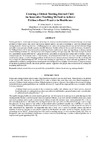Identificador persistente para citar o vincular este elemento:
https://accedacris.ulpgc.es/jspui/handle/10553/52725
| Campo DC | Valor | idioma |
|---|---|---|
| dc.contributor.author | Schimböck, F. | en_US |
| dc.contributor.author | Eichhorn, J. | en_US |
| dc.date.accessioned | 2019-01-29T12:15:51Z | - |
| dc.date.available | 2019-01-29T12:15:51Z | - |
| dc.date.issued | 2018 | en_US |
| dc.identifier.isbn | 978-84-09-02374-5 | en_US |
| dc.identifier.uri | https://accedacris.ulpgc.es/handle/10553/52725 | - |
| dc.description.abstract | Nursing practice is increasingly focusing on delivering care based on empirical evidence or research findings. As primary providers of direct patient care, nurses and nursing students need to use current knowledge to meet this evidence-based nursing demands. Achieving this issue is challenging because nurses and nursing students may not have the knowledge and skills to interpret and critically appraise scientific literature. Traditional face to face journal club formats, founded by Sir William Osler in 1875, have been used as teaching method in health care to share new knowledge, to discuss current research findings in relation to clinical practice and to improve reading and appraising skills. This format is typically based on a presentation session followed by a group discussion. Limitations of such formats include lack of interest, time or research expertise. To overcome some of these barriers, virtual journal club (VJC) formats have been developed using social media, intranet, e-mail or learning platforms to discuss in synchronous and asynchronous ways. By combining the two concepts of online learning and VJC, we have been creating an opportunity for nurses and nursing students to learn collaboratively while discussing evidence-based practice knowledge at a time and place of convenience. Using the example of the learning platform Moodle, this article provides general suggestions for people who are interested in creating and organizing their own VJC. | en_US |
| dc.language | eng | en_US |
| dc.source | V Jornadas Iberoamericanas de Innovación Educativa en el Ámbito de las TIC y las TAC, Las Palmas de Gran Canaria, 15 y 16 de noviembre de 2018, p. 31-37 | en_US |
| dc.subject | 58 Pedagogía | en_US |
| dc.subject | 530602 Innovación tecnológica | en_US |
| dc.subject.other | Virtual journal club | en_US |
| dc.subject.other | Online journal club | en_US |
| dc.subject.other | e-journal club | en_US |
| dc.subject.other | Evidence-based nursing | en_US |
| dc.subject.other | Nursing education | en_US |
| dc.title | Creating a Virtual Nursing Journal Club: an innovative teaching method to achieve evidence-based practice in healthcare | en_US |
| dc.type | info:eu-repo/semantics/conferenceObject | en_US |
| dc.type | ConferenceObject | en_US |
| dc.relation.conference | V Jornadas Iberoamericanas de Innovación Educativa en el Ámbito de las TIC y las TAC (InnoEducaTIC 2018) | en_US |
| dc.description.lastpage | 37 | en_US |
| dc.description.firstpage | 31 | en_US |
| dc.investigacion | Ingeniería y Arquitectura | en_US |
| dc.type2 | Actas de congresos | en_US |
| dc.identifier.ulpgc | Sí | es |
| item.grantfulltext | open | - |
| item.fulltext | Con texto completo | - |
| crisitem.event.eventsstartdate | 15-11-2018 | - |
| crisitem.event.eventsenddate | 16-11-2018 | - |
| Colección: | Actas de congresos | |
Visitas
142
actualizado el 10-ene-2026
Descargas
287
actualizado el 10-ene-2026
Google ScholarTM
Verifica
Altmetric
Comparte
Exporta metadatos
Los elementos en ULPGC accedaCRIS están protegidos por derechos de autor con todos los derechos reservados, a menos que se indique lo contrario.
